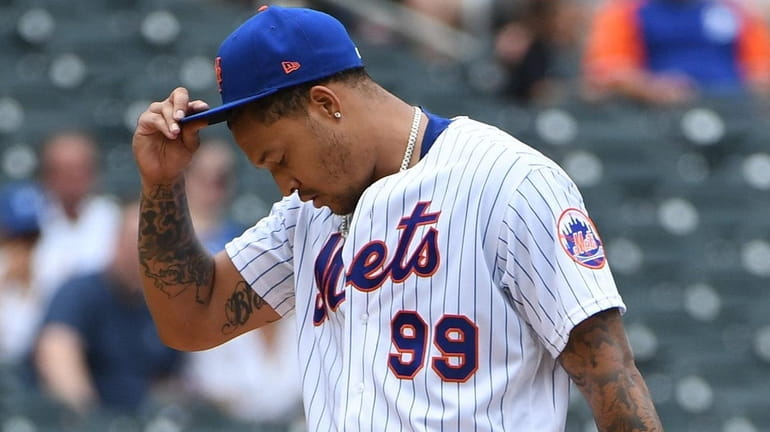Steve Cohen's first trade deadline as Mets owner has high stakes

New York Mets starting pitcher Taijuan Walker reacts on the mound after giving up a solo home run to Atlanta Braves' Abraham Almonte during the fourth inning of an MLB baseball game at Citi Field on Thursday, July 29, 2021. Credit: Kathleen Malone-Van Dyke
At 4 p.m. on Friday, Mets owner Steve Cohen will have his eye on the clock for two reasons:
The closing bell on Wall Street. And baseball’s trade deadline. It’s a delicious coincidence for the rookie owner’s first trade deadline.
The closing bell? Cohen has faced that thousands of times. You know the billionaire hedge fund titan has no fear about moving millions of dollars around with the touch of a button or a wink to a subordinate. It’s what he does for a living.
Signing off on a baseball trade or two that could determine whether your newest toy – a first-place ballclub with a comfortable lead even after Thursday’s 6-3 loss to the Braves – wins a World Series is a different animal.
What do the Mets need? Simple: starting pitching. Max Scherzer would be nice and would be the kind of bold move Cohen would love to make, but the three-time Cy Young award winner wouldn’t OK a deal to the Mets.
The rest of the known available arms are not that inspiring. The cost is said to be as high as a last-minute Hamptons rental in late July.
Cohen, a noted poker player as a youth, hinted at his strategy in a Twitter post on July 19: "Let’s play GM again. Make a trade now and pay a big price or wait until closer to the deadline and pay a reasonable price?"
Good question. It’s one that Cohen, team president Sandy Alderson and acting general manager Zack Scott have probably been kicking around for weeks.
It may be worth noting that Cohen, who has proven to be quite the Twitter savant since buying the team, hadn’t posted any new Tweets since July 19 as of 4 p.m. on Thursday – 24 hours before the deadline.
It’s also worth noting that Cohen’s first foray into an MLB deadline of sorts hasn’t quite gone as the Mets had hoped.
Remember when Francisco Lindor, after being traded to the Mets with great fanfare, said he wouldn’t talk about a contract extension once the season started?
Cohen posted on that negotiation on social media as well, asking on March 26: "What do [you] think Lindor will accept? I’m going to crowdsource the answer."
Five days later, Lindor agreed to a 10-year, $341-million extension which most Mets fans cheered at the time despite the staggering sum.
What’s $341-million to a guy whose worth is estimated at about $14 billion?
Today, with Lindor on the injured list after underperforming -- and appearing to be a bit thin-skinned for New York -- does that contract look like a good one?
Lindor’s "deadline" was a self-declared one. Any pressure Cohen and the Mets felt to sign him before the start of the season came from within.
Perhaps the Mets feared that it would have been a giant negative to go into the season with Lindor as a pending free agent after all the good vibes they got for trading for him.
In his first deadline negotiation as an owner, it was Cohen who blinked and Lindor who got the sweet deal.
The July 31 trade deadline used to be known as the non-waiver trade deadline. Trades could be made after that, but the players would have to go through waivers.
The team the Mets have as of 4 p.m. on Friday – including their star players currently on the injured list -- will be the team that tries to hold off the Braves and Phillies in a very winnable NL East.
Pete Alonso cited Friday’s Mets debut of Carlos Carrasco and the hoped-for returns of Jacob deGrom, Noah Syndergaard and Lindor from the injured list as reasons the Mets don’t have to make a big deal.
(Alonso also claimed not to know Friday was the deadline. With bluffs like that, Alonso would be a terrible poker player.)
Does the owner feel the same way about the Mets walking away if they don’t find a deal they like? Is that the card he’s telling Alderson to play in talks with other teams?
Cohen clearly knows how to play chicken at a poker table and in a multi-million dollar Wall Street negotiation.
We’ll find out soon if those skills translate into the unique crucible of baseball’s trade deadline.

